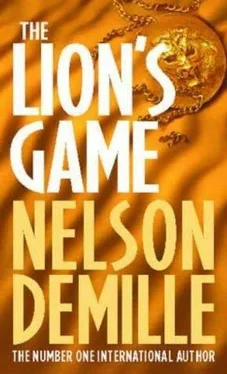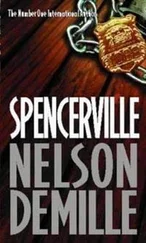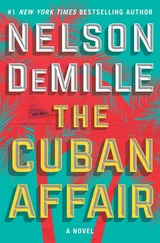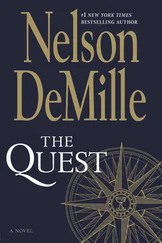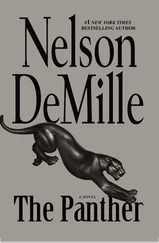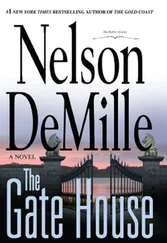It had taken over a decade and many millions of dollars before Libyan Intelligence gained access to this list of eight men. It had taken years longer to locate each of these murderers. One of them, Lieutenant Steven Cox, the weapons officer on the aircraft known as Remit 61, was beyond his reach, having been killed on a mission in the Gulf War. Khalil did not feel cheated, but was happy in the knowledge that Lieutenant Cox had died at the hands of Islamic fighters.
Asad Khalil's first victim, Colonel Hambrecht, had been sent home to America in small pieces in January. The body of his second victim, General Waycliff, was still warm, and the man's blood was inside Khalil's body.
That left five.
By this evening, Lieutenant Paul Grey would join his three squadron mates in hell.
Then there would be four.
Khalil knew that Libyan Intelligence had learned some of the names of the other pilots from other squadrons who had bombed Benghazi and Tripoli, but those men would be dealt with at another time. Asad Khalil had been given the honor of striking the first blow, of personally avenging the death of his own family, the death of the Great Leader's daughter, and the injuries suffered by the Great Leader's wife and sons.
Khalil had no doubt that the Americans had long forgotten April 15, 1986. They had bombed so many places since then that this incident was considered of little importance. In the Gulf War, tens of thousands of Iraqis had perished at the hands of the Americans and their allies, and the Iraqi leader, Hussein, had done little to avenge the death of his martyrs. But the Libyans were not like the Iraqis. The Great Leader, Gadhafi, never forgot an insult, a betrayal, or the death of a martyr.
He wondered what Lieutenant Paul Grey was doing at this moment. He wondered, too, if this man was one of the ones that General Waycliff had telephoned yesterday. Khalil had no idea if the surviving men all kept in contact, but according to the General's date book, there had been a conference call on April 15. And as for the frequency of their contact, having spoken only two days ago, it was unlikely they would speak again unless someone notified them of General Waycliff's death. Certainly Mrs. Waycliff was not going to notify them. In fact, it might be twenty-four hours before the bodies were even discovered.
Khalil also wondered if the death of the Waycliffs and their servant would be regarded as a robbery and murder. He thought that the police, like police everywhere, would look on the scene as a common crime. But if the intelligence organization became involved, they might see things differently.
In any case, even if they did, they had no reason to think first of Libya. The General's career had been long and varied, and his assignment to the Pentagon raised many other possibilities in the event that anyone was suspicious of a political murder.
The most important circumstance that Khalil knew he had on his side was the fact that almost no one knew that these fliers had participated in the April 15 raid. There were no references to the raid even in their personnel files, as Libyan and Soviet Intelligence had discovered. There was, in fact, only a list, and the list was classified top secret. The secrecy had protected these men for over a decade. But now that same secrecy would make it very difficult for the authorities to make a connection between what happened at Lakenheath, England, Washington, D.C., and soon, Daytona Beach, Florida.
But the men themselves knew what they had in common, and that had always been a problem. Khalil could only pray that God would keep his enemies in ignorance. That, plus speed and deception, would ensure that he would be able to kill all of them, or at least most of them.
Malik had said to him, 'Asad-they tell me you have a sixth sense, that you can feel danger before you can see it, smell it, or hear it. Is that true?"
Khalil had replied, "I think I have this gift." He then told Malik of the night of the raid-leaving out the part about Bahira. He'd said to Malik, "I was on a roof praying, and before the first aircraft even arrived, I felt the presence of danger. I had a vision of monstrous and terrible birds of prey descending through the Ghabli toward our country. I ran home to tell my family… but it was too late."
Malik had nodded and said, "The Great Leader, as you know, goes into the desert to pray, and visions come to him as well."
Khalil knew this. He knew that Moammar Gadhafi had been born in the desert into a nomadic family. Those born in the desert to nomads were twice blessed, and many of them had powers that those who had been born in the cities and towns on the coast did not have. Khalil was vaguely aware that the mysticism of the desert people preceded the coming of Islam, and that some considered these beliefs to be blasphemy. For that reason, Asad Khalil, who had been born in the Kufra oasis-neither coast nor desert-did not often speak of his sixth sense.
But Malik knew of it and said to him, "When you feel danger, it is not cowardly to run. Even the lion runs at danger. That is why God gave him more speed than he needs to run down his prey. You must listen to your instincts. If you do not, this sixth sense of yours will leave you. If you ever feel that you have lost this power, then you must make up for it with more cunning and more caution."
Khalil thought he understood what Malik was saying.
But then Malik said, bluntly, "You may die in America, or you may escape from America. But you cannot be captured in America."
Khalil had not responded.
Malik continued, "I know you are brave and would never betray our country or our God, or our Great Leader, even under torture. But if they get their hands on you, alive, that is all the proof they will need to retaliate against our country.
The Great Leader himself has asked me to tell you that you must take your own life if capture becomes imminent."
Khalil recalled being surprised at this. He had no intention of being captured, and would gladly take his own life if he thought it was necessary.
But he had envisioned a situation where he might be captured alive. He thought this would be acceptable, even beneficial to the cause. He could then tell the world who he was, how he had suffered, and what he had done to avenge that night of hell. This would excite all of Islam, redeem the honor of his country, and humiliate the Americans.
But Malik had rejected that possibility, and the Great Leader himself had prohibited such an ending to his Jihad.
Khalil thought about this. He understood why the Great Leader would not want to invite another American air strike. But that was, after all, the nature of the blood feud. It was like a circle-a circle of blood and death without end. The more blood, the better. The more martyrs, the more God would be pleased, and the more united would Islam become.
Khalil put these thoughts out of his mind, knowing that the Great Leader had a strategy that could only be comprehended by those chosen few around him. Khalil thought that someday he might be taken into the inner circle, but for now, he would serve as one of many Mujahadeen-the Islamic Freedom Fighters.
Khalil drew his thoughts from the past and projected them into the future. He went into a trance-like state, which was not difficult on this straight, uninteresting highway. He projected his mind hours and miles ahead, to this place called Daytona Beach. He visualized the house he had seen in the photographs, and the face of the man called Paul Grey. He tried to envision or sense any danger ahead, but he felt no peril lurking, no trap ready to spring closed on him.
In fact, he had a vision of Paul Grey running naked through the desert, the Ghabli blinding him as a huge and hungry desert lion ran behind him, closing the distance with every stride.
Читать дальше
